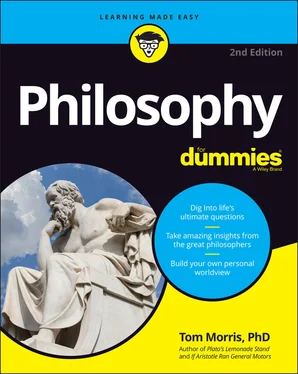Tom Morris - Philosophy For Dummies
Здесь есть возможность читать онлайн «Tom Morris - Philosophy For Dummies» — ознакомительный отрывок электронной книги совершенно бесплатно, а после прочтения отрывка купить полную версию. В некоторых случаях можно слушать аудио, скачать через торрент в формате fb2 и присутствует краткое содержание. Жанр: unrecognised, на английском языке. Описание произведения, (предисловие) а так же отзывы посетителей доступны на портале библиотеки ЛибКат.
- Название:Philosophy For Dummies
- Автор:
- Жанр:
- Год:неизвестен
- ISBN:нет данных
- Рейтинг книги:4 / 5. Голосов: 1
-
Избранное:Добавить в избранное
- Отзывы:
-
Ваша оценка:
- 80
- 1
- 2
- 3
- 4
- 5
Philosophy For Dummies: краткое содержание, описание и аннотация
Предлагаем к чтению аннотацию, описание, краткое содержание или предисловие (зависит от того, что написал сам автор книги «Philosophy For Dummies»). Если вы не нашли необходимую информацию о книге — напишите в комментариях, мы постараемся отыскать её.
Philosophy For Dummies
Philosophy For Dummies
Philosophy For Dummies — читать онлайн ознакомительный отрывок
Ниже представлен текст книги, разбитый по страницам. Система сохранения места последней прочитанной страницы, позволяет с удобством читать онлайн бесплатно книгу «Philosophy For Dummies», без необходимости каждый раз заново искать на чём Вы остановились. Поставьте закладку, и сможете в любой момент перейти на страницу, на которой закончили чтение.
Интервал:
Закладка:
Some days later, we received a call from the store that the grill was in, assembled, and “ready to go.” My wife bought the burgers and hot dogs, and all the other normal cookout stuff, and prepared for a feast. When the delivery guys arrived, they pointed out that I would have to hook up the gas tank to the grill when I was ready to use it. They explained that they were required to deliver it unattached. I assumed it was really dangerous to transport the tank hooked up.
They drove away, and with the assistance of written instructions and diagrams, I went to work trying to hook up the tank. I fumbled with the hose and connectors, and kept getting it wrong, and I felt myself getting short of breath. I was doing all this outside so that any leaking propane would dissipate quickly, but obviously there wasn’t enough of a breeze and I was getting too much of it into my lungs. I finally got it hooked up. But when I tried to light the grill, there was no fire. As I hung over it inspecting all the connections, I could feel myself getting light-headed and nauseous from more of the dangerous, deadly gas.
I called the store explained what I had done, and that I was obviously breathing so much propane at this point that I was getting really sick. In my mental fog, I could hear the guy who sold us the grill ask me a question.
“Where did you take the tank to get your propane?”
“What do you mean? The grill was just delivered, and the delivery guy said it was ready to go.”
“Oh, it was, except for the gas. We sell only new tanks with our grills, and they come empty. You have to go to a gas station to buy gas for it. That’s why it won’t light. You got an empty tank.”
Oh. I was being asphyxiated by a false belief. I was having physical symptoms from something that wasn’t there. But a breath of fresh information was all it took, and I was fine. Physically, at least. Mentally, I was embarrassed. My wife and kids laughed a lot. And they went to get some take-out food. I suppose Chaucer was right when he said, “People can die of mere imagination.”
In a way, it’s really good that this happened to me. As a philosopher, I learned something important about the power of our beliefs, and our imaginations, as well as about the hidden assumptions that can govern our thinking, acting, and feeling. The mind is indeed a powerful thing. And false beliefs can have a big impact on us.
The image of Plato’s Cave
Plato had a memorable image for the false beliefs and illusions we too often suffer. He wrote that we are all like prisoners living in a cave, chained down to the floor, our gazes fixed on shadows flitting across a wall, mere images that we mistake for realities.
Plato’s image of the cave was actually quite elaborate, but here is the gist: Imagine that behind us in this cavern, there is a fire burning that casts shadows on the walls that are all we ever see, until the day someone breaks free of his chains, sees our situation as it truly is, and escapes the cave altogether, emerging into real daylight. At first, he is blinded by the glare of the sun, that object of which the cavern fire was but a poor copy. But then his eyes begin to adjust and can see real objects, animals, rocks, and trees. Realizing the difference between the outside world and the poor dim shadow world in which he had been imprisoned, he returns to the cave to convince the others there to break their chains as well and ascend into the light of reality. Philosophy is all about escaping from the cave of illusions where too many people are trapped.
The philosophical Houdini
The man who first escapes the cave of illusion that Plato thinks we live in is the philosopher, the one among us who comes to realize that we are all in some way living lives of illusion, held captive by shadows and chains not of our own making. When he brings back into the cave his strange tale of other things and greater realities, he is cheered by some and jeered by others. We have a way of becoming comfortable with our illusions when they are all we’ve ever known. And so we are easily threatened by any strange reports of greater realities. But the true philosopher tries to free as many of his fellow captives as possible, liberating them to live in the broader, brighter realities that lie beyond the narrow confines of their customary perceptions.
That is a vivid image of the ultimate task of philosophy. Its goal is to free us from illusion and help us get a grip on the most fundamental realities of our world.
PLATO AS THE SOURCE
Plato is seen by many to be the ultimate source of all western philosophy.
Out of Plato come all things that are still written and debated among men of thought.
— Ralph Waldo Emerson
The safest characterization of the European philosophical tradition is that it consists of a series of footnotes to Plato.
— Alfred North Whitehead
Think about any illusions you could be living under right now. There may be things you value that really lack the importance you attribute to them. There could be matters you’re ignoring that are really of immense value. You might be making assumptions about your life that are based on mere appearances and not the realities of your situation. Most people are chained down by all sorts of illusions. It’s the goal of philosophy, well done, to help us all break those chains.
 We actually have no choice of whether to do philosophy or not, of whether to be philosophers or not. We inevitably operate out of some philosophical worldview, however well-formed or incomplete it might be. Our choice is between bad philosophy, either unreflectively absorbed from the culture around us and the prejudices of our time, or done sloppily without guidance, and the vastly preferable alternative of good philosophy built on critical questioning and sustained thought.
We actually have no choice of whether to do philosophy or not, of whether to be philosophers or not. We inevitably operate out of some philosophical worldview, however well-formed or incomplete it might be. Our choice is between bad philosophy, either unreflectively absorbed from the culture around us and the prejudices of our time, or done sloppily without guidance, and the vastly preferable alternative of good philosophy built on critical questioning and sustained thought.
Everyone has a choice. We can be poor thinkers or good philosophers. But quality comes only with care. Careful thinking makes for the best philosophy. Does your philosophy of life imprison you or liberate you? Are you a careful or careless thinker? In this book, I try to dispel some of the myths and platitudes of our own age and get out of the cave of our false assumptions. We seek philosophical enlightenment, philosophical liberation.
The first day of the rest of your life need not begin and end in Plato’s Cave.
Plato helped to launch the activity of Western philosophy, as we know it today, by writing lively dialogues featuring his teacher and mentor Socrates. Someone would have a party, and Socrates would show up. As the wine was being passed around, he’d start up a conversation, asking others present what they thought about some important topic. They’d answer, and he’d gently question what they said, investigating the ideas they brought up, and they would then reply. Then the philosopher would dig even deeper. Or Socrates would be walking down the street and see a friend, who would greet him warmly. A conversation would begin. And philosophical thoughts would soon emerge. The old man was always in action, thinking, probing, testing, and rethinking.
Philosophy is meant to be an activity in several ways. It’s a form of intellectual self-defense as well as discovery. The philosopher works to get beyond mere appearances to the important realities beneath them. The determined thinker actively works to discover new ideas, analyze, and refine those concepts, and then find new ways to put them to use, creatively and well. And this is a part of the activity of philosophy that’s often overlooked. Philosophy isn’t just about thinking hard about big ideas; it’s also about living in the constant light of those ideas that matter. It’s meant to be an adventure in living, a way of proceeding well and wisely in the world. And when you do it right, I like to think you make Plato and his mentor Socrates proud.
Читать дальшеИнтервал:
Закладка:
Похожие книги на «Philosophy For Dummies»
Представляем Вашему вниманию похожие книги на «Philosophy For Dummies» списком для выбора. Мы отобрали схожую по названию и смыслу литературу в надежде предоставить читателям больше вариантов отыскать новые, интересные, ещё непрочитанные произведения.
Обсуждение, отзывы о книге «Philosophy For Dummies» и просто собственные мнения читателей. Оставьте ваши комментарии, напишите, что Вы думаете о произведении, его смысле или главных героях. Укажите что конкретно понравилось, а что нет, и почему Вы так считаете.












